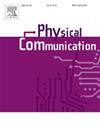Sum rate optimization in STAR-RIS assisted multiuser massive MIMO-OFDM VLC systems
IF 2
4区 计算机科学
Q3 ENGINEERING, ELECTRICAL & ELECTRONIC
引用次数: 0
Abstract
Visible Light Communication (VLC) offers a promising solution for future networks, leveraging existing lighting infrastructure in indoor environments. However, VLC requires a direct line of sight to function which can be limiting. Reconfigurable Intelligent Surface (RIS) is a new technology that can bend light and radio waves, addressing this limitation in VLC. RIS come in three types: passive which reflects signals, active that boosts and reflects signals, and Simultaneous Transmission and Reflection (STAR)-RIS which can both reflect and transmit signals simultaneously. STAR-RIS offers the most control over the signal. In this paper, we propose a new multi-user VLC system with a massive Multiple-Input, Multiple-Output Orthogonal Frequency-Division Multiplexing (MIMO-OFDM) architecture, leveraging STAR-RIS to optimize data rates and improve coverage, particularly in non-line-of-sight scenarios. We formulate a system model and solve a convex optimization problem to determine the optimal transmission and reflection coefficients for STAR-RIS elements, aiming to maximize the total sum rate for all users. By employing maximum ratio transmission precoding, we minimize interference among users and demonstrate significant performance gains. Simulation results show that our proposed energy splitting-based STAR-RIS configuration outperforms traditional mode selection and time switching approaches with fixed or random coefficients, yielding substantial improvements in data rates and user experience. This study offers the first detailed exploration of STAR-RIS in VLC systems, highlighting its potential for future high-speed, multi-user communication networks. Our findings set the stage for further research into optimizing VLC systems using STAR-RIS, particularly in complex environments with non-line-of-sight users and massive MIMO-OFDM configurations.
STAR-RIS 辅助多用户大规模 MIMO-OFDM VLC 系统中的总和速率优化
可见光通信(VLC)利用室内环境中现有的照明基础设施,为未来网络提供了一种前景广阔的解决方案。然而,可见光通信需要直接视线才能发挥作用,这可能会造成限制。可重构智能表面(RIS)是一种能弯曲光和无线电波的新技术,可解决 VLC 的这一限制。RIS 有三种类型:反射信号的被动式、增强和反射信号的主动式,以及可同时反射和发射信号的同步传输和反射(STAR)-RIS。STAR-RIS 对信号的控制能力最强。在本文中,我们提出了一种新型多用户 VLC 系统,该系统采用大规模多输入多输出正交频分复用(MIMO-OFDM)架构,利用 STAR-RIS 优化数据传输速率并改善覆盖范围,尤其是在非视距场景中。我们建立了一个系统模型,并解决了一个凸优化问题,以确定 STAR-RIS 单元的最佳传输和反射系数,从而最大限度地提高所有用户的总和速率。通过采用最大比率传输预编码,我们最大限度地减少了用户之间的干扰,并取得了显著的性能提升。仿真结果表明,我们提出的基于能量分配的 STAR-RIS 配置优于采用固定或随机系数的传统模式选择和时间切换方法,大大提高了数据传输率和用户体验。本研究首次详细探讨了 VLC 系统中的 STAR-RIS,突出了其在未来高速多用户通信网络中的潜力。我们的研究结果为进一步研究利用 STAR-RIS 优化 VLC 系统奠定了基础,尤其是在具有非视距用户和大规模 MIMO-OFDM 配置的复杂环境中。
本文章由计算机程序翻译,如有差异,请以英文原文为准。
求助全文
约1分钟内获得全文
求助全文
来源期刊

Physical Communication
ENGINEERING, ELECTRICAL & ELECTRONICTELECO-TELECOMMUNICATIONS
CiteScore
5.00
自引率
9.10%
发文量
212
审稿时长
55 days
期刊介绍:
PHYCOM: Physical Communication is an international and archival journal providing complete coverage of all topics of interest to those involved in all aspects of physical layer communications. Theoretical research contributions presenting new techniques, concepts or analyses, applied contributions reporting on experiences and experiments, and tutorials are published.
Topics of interest include but are not limited to:
Physical layer issues of Wireless Local Area Networks, WiMAX, Wireless Mesh Networks, Sensor and Ad Hoc Networks, PCS Systems; Radio access protocols and algorithms for the physical layer; Spread Spectrum Communications; Channel Modeling; Detection and Estimation; Modulation and Coding; Multiplexing and Carrier Techniques; Broadband Wireless Communications; Wireless Personal Communications; Multi-user Detection; Signal Separation and Interference rejection: Multimedia Communications over Wireless; DSP Applications to Wireless Systems; Experimental and Prototype Results; Multiple Access Techniques; Space-time Processing; Synchronization Techniques; Error Control Techniques; Cryptography; Software Radios; Tracking; Resource Allocation and Inference Management; Multi-rate and Multi-carrier Communications; Cross layer Design and Optimization; Propagation and Channel Characterization; OFDM Systems; MIMO Systems; Ultra-Wideband Communications; Cognitive Radio System Architectures; Platforms and Hardware Implementations for the Support of Cognitive, Radio Systems; Cognitive Radio Resource Management and Dynamic Spectrum Sharing.
 求助内容:
求助内容: 应助结果提醒方式:
应助结果提醒方式:


